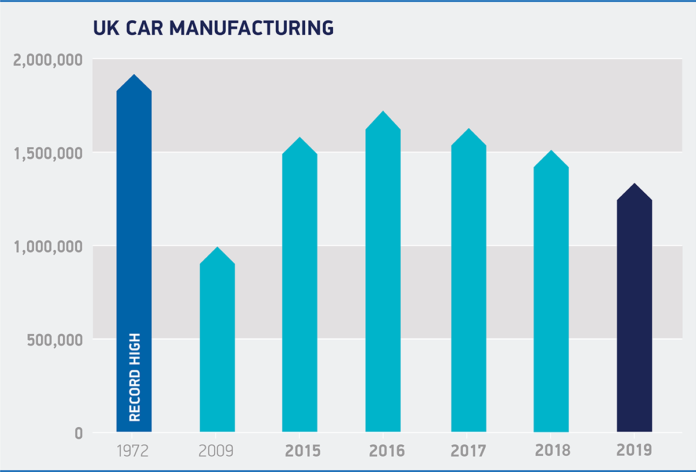British car manufacturing has fallen for third consecutive year, down -14.2% in 2019 to 1.3m units – the lowest since 2010.
Figures released by the Society of Motor Manufacturers also revealed that production for UK and overseas has declined -12.3% and -14.7%, with 81% of cars built for export,the vast majority to the EU.
It was a good year for alternatively fuelled and small volume car output, with production up 34.7% and 16.2% respectively while new figures reveal importance of auto manufacturing to UK’s regional growth, with £6bn paid out in workforce wages every year.
Output was affected by multiple factors, including weakened consumer and business confidence at home, slower demand in key overseas markets, a number of significant model production changes and a shift from diesel across Europe.
Factory shutdowns in the spring and autumn, timed to mitigate expected disruption arising from the anticipated departure of the UK from the EU on 29 March and 31 October, also had a marked effect.
Last year saw a welcome £1.10 billion of fresh automotive investment publicly announced for the UK. The bulk of that investment, however, was from one company looking to expand electric vehicle production in the West Midlands. With 2019’s investment tally some 60% lower than the £2.75 billion averaged over the previous seven years, it’s clear that more must be done to encourage overseas investors to follow suit.
The news comes as SMMT reveals new figures highlighting the critical contribution of UK Automotive to regions right across Britain. One in 14 people (168,000) employed in manufacturing nationwide works in Automotive, with an additional 279,000 jobs supported, while in regions such as the North East and West Midlands, automotive accounts for more than one in six manufacturing jobs. With annual salaries typically 21% higher than the average across all UK employment, Automotive’s combined national salary contribution amounts to some £6 billion.4
Mike Hawes, SMMT Chief Executive, said,
The fall of UK car manufacturing to its lowest level in almost a decade is of grave concern. Every country in the world wants a successful automotive sector as it is a driver of trade, productivity and jobs.
Given the uncertainty the sector has experienced, it is essential we re-establish our global competitiveness and that starts with an ambitious free trade agreement with Europe, one that guarantees all automotive products can be bought and sold without tariffs or additional burdens.
This will boost manufacturing, avoid costly price rises and maintain choice for UK consumers. Negotiations will be challenging but all sides stand to gain and this sector is up for it.







